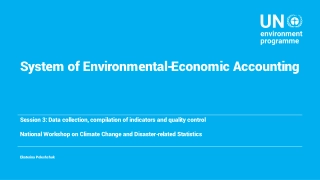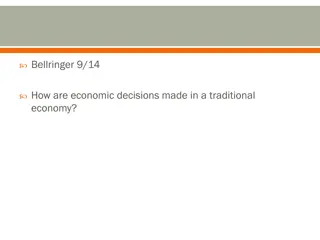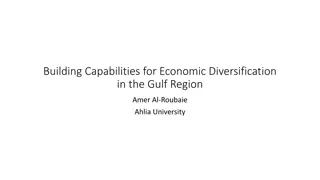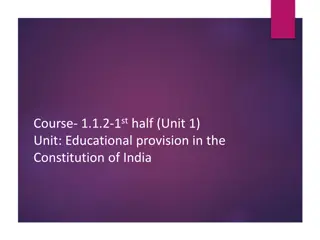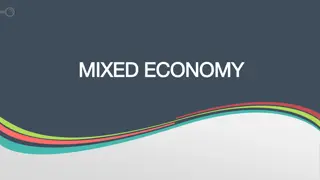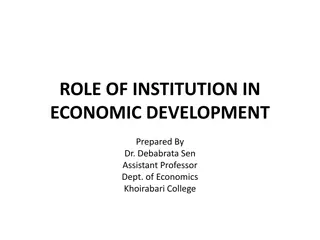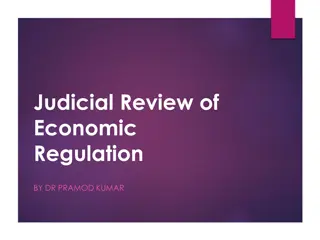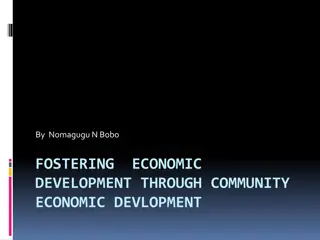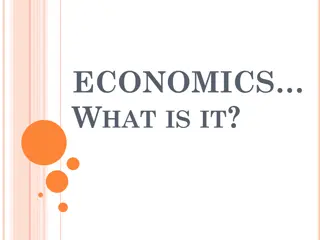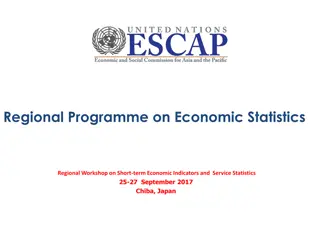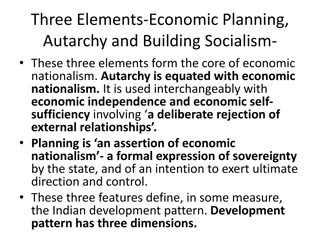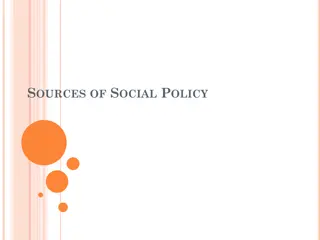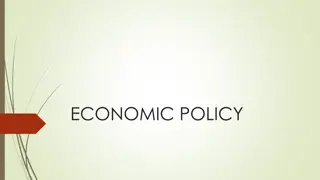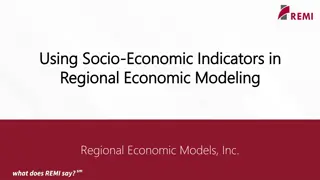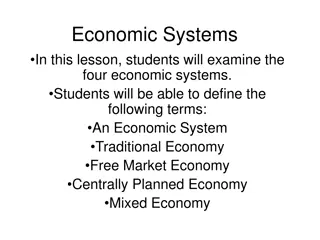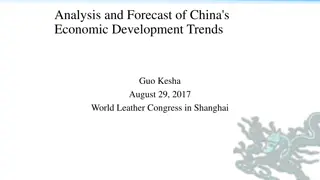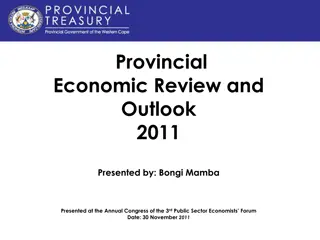Understanding the System of Environmental-Economic Accounting (SEEA)
The System of Environmental-Economic Accounting (SEEA) is a framework that combines economic and environmental data to offer a comprehensive view of the connection between the economy and the environment. It includes standard concepts, definitions, and classifications for producing internationally c
108 views • 11 slides
Economic Impact of Hosting the Olympics: A Case Study of London 2012
London hosted the 2012 Olympics, with a significant economic impact on the country. The Games saw record-breaking coverage and participation, but also incurred substantial costs. The total expenditure exceeded the original budget, with the government and various entities contributing to funding. Des
1 views • 28 slides
Enhanced Access to Economic Opportunities and Employability: A Strategic Focus
This strategy outlines Priority Focus Area 7, aiming to provide improved access to economic opportunities and employability by enhancing skills, education, transport, and housing. The initiative seeks to create a thriving society where all citizens have better access to economic pathways, employment
2 views • 28 slides
Geospatial Comparison of Economic Change and Climate Disasters in Asia-Pacific
This study explores the impact of natural disasters on economic indicators in Southern and Western Asian countries over time, aiming to assist in policy-making by understanding the relationship between natural disasters and the economy. It discusses the increasing incidences of extreme weather event
4 views • 18 slides
Understanding Sustainable Business Models in the Context of Open Data and Socio-Economic Perspectives
Explore the intricate interplay between sustainable business models, open data practices, and socio-economic perspectives presented by Andrew Coote. Delve into the impacts, assessment methods, and the importance of data accessibility in decision-making. Gain insights into the FAIR principles and the
1 views • 16 slides
2023/24 Annual Performance Plan Presentation for Small Business Development Department
The presentation outlines the 2023/24 Annual Performance Plan of the Department of Small Business Development, covering situational analysis, global economic outlook, performance priorities, game-changers program, alignment with economic recovery plans, institutional program performance, key risks a
27 views • 59 slides
U.S. Virgin Islands Economic Development Authority Webinar: Small Business COVID-19 Resources
The U.S. Virgin Islands Economic Development Authority held a webinar focused on providing resources and assistance for small businesses impacted by COVID-19. The agenda covered the overall economic impact, reliable resources, SBA Economic Injury Disaster Loan (EIDL), and the tourism industry. Speak
0 views • 13 slides
International Law of War: Nuremberg Principles and Accountability
The Nuremberg Principles, derived from the trials of Nazi officials for war crimes, establish accountability in international law. These principles hold individuals responsible for committing acts considered crimes under international law, regardless of their position or orders received. The assumpt
2 views • 22 slides
Economic Systems in the United Kingdom, Germany, and Russia
Economic decisions in traditional economies are based on customs and beliefs. The United Kingdom has a mixed market economy with a focus on service industries, while Germany's economy is export-based. Russia's economy leans towards a command system. By comparing these economic systems, one can see h
0 views • 11 slides
Understanding Key Concepts in Economic Geography
Economic Geography is a sub-discipline that utilizes a geographical approach to analyze the spatial distribution of economic activities at various scales. It focuses on the location of economic activities and their relationship with the environment, encompassing primary, secondary, and tertiary sect
1 views • 20 slides
Enhancing Economic Diversification in the Gulf Region
Economic diversification in the Gulf region is crucial for sustainable growth and development. Productive capacities, defined as the resources and capabilities enabling countries to produce goods and services, play a key role. Economic diversification involves shifting towards a varied structure of
0 views • 13 slides
Directive Principles of State Policy in the Indian Constitution
The Directive Principles of State Policy in the Indian Constitution provide guidelines for governance, focusing on social justice, economic welfare, and a just society. These principles are inspired by socialist ideology and aim at ensuring social and economic justice by minimizing inequalities, pro
2 views • 16 slides
Understanding Mixed Economy: A Balanced Economic Model
Mixed economy combines elements of socialism and capitalism, allowing both public and private sectors to coexist. Government intervention aims to achieve a balance between individual initiatives and societal goals, promoting economic development while addressing inequalities. Features include econom
0 views • 15 slides
Role of Institutions in Economic Development: A Comprehensive Analysis
Understanding the significance of institutions in economic development is crucial, as they play a pivotal role in shaping societal, political, and economic relations. Institutions, defined as established customs or practices, act as the rules of the game that structure human interactions. Their qual
0 views • 13 slides
Economic Perspectives on Malaria Control and Elimination
Analyzing malaria control and elimination from an economic standpoint is crucial for understanding the long-term health outcomes, cost savings, operational strategies, funding gaps, and wider economic consequences of the disease. By examining the correlation between malaria and poverty, exploring fu
4 views • 21 slides
Understanding Economic Systems and Their Impacts
Explore traditional, command, and market economies, and how they address economic questions. Understand the concept of mixed economies and their placement on a continuum between market and command systems. Compare economic systems in Israel, Saudi Arabia, and Turkey. Delve into essential economic vo
0 views • 17 slides
Data Room at Banco de Mexico: Enhancing Data Sharing for Economic Research
Banco de Mexico has been gathering granular data on financial transactions since the mid-1990s to monitor compliance, risks, and economic interactions. The creation of a Data Room allows for efficient and secure data sharing, contributing to economic research and analysis. The Economic Microdata Lab
3 views • 12 slides
Judicial Review of Economic Regulation: A Case Study
Courts have limited scope in reviewing economic policy matters unless decisions are arbitrary, mala fide, or violate laws. A recent case involving the Small Scale Industrial Manufacturers Association vs. Union of India showcases the challenges of judicial review in economic distress situations cause
0 views • 15 slides
Economic Impact of COVID-19 Pandemic on Business in Rwanda: VAR Model Analysis
The study investigates the effects of COVID-19 on business start-ups, money supply, lending interest rates, international trade, savings, investments, and economic growth in Rwanda using a VAR model. The research highlights the changes in economic activities due to the pandemic and explores the impa
0 views • 10 slides
Fostering Economic Development Through Community Economic Development
Community Economic Development (CED) involves local actions to create economic opportunities improving social conditions, especially for the disadvantaged. It recognizes the interdependence of economic, environmental, and social challenges, emphasizing solutions rooted in local knowledge. The ultima
1 views • 30 slides
Understanding Irish Economic History Since Independence
This topic delves into the economic evolution of Ireland since gaining independence, exploring key milestones such as shifts from globalization to autarky, and from autarky to globalization. It also discusses the economic structures of different decades, offering a comprehensive view of Ireland's ec
1 views • 44 slides
Understanding Economic Systems and Questions
Explore the concepts of traditional, command, and market economies, and how they answer key economic questions. Learn about economic systems in Canada, Cuba, and Brazil, and grasp the fundamental economic questions of what to produce, how to produce, and for whom to produce. Understand the basics of
0 views • 26 slides
Enhancing Economic Statistics in Asia-Pacific Region
The Regional Programme on Economic Statistics aims to improve economic statistics in the Asia-Pacific region by enhancing capacity and coordination among National Statistical Offices (NSOs) and other stakeholders. The programme focuses on implementing the Core Set of Economic Statistics to facilitat
0 views • 11 slides
Understanding Australia's Economic Development and History
Explore the economic future of Australia through units focusing on financial literacy, government structure, historical context, and current affairs. Dive into key concepts such as small business initiatives, taxation, colonial history, and governmental systems, all contributing to shaping Australia
0 views • 35 slides
Economic Nationalism and Development Pattern in India
Economic nationalism in India was characterized by the elements of economic planning, autarchy, and socialism. The development pattern focused on capital goods industries, inward orientation, and state ownership. Two interpretations of this pattern were influenced by economic theory and Marxist pers
0 views • 13 slides
Overview of Directive Principles of State Policy in Indian Constitution
Directive Principles of State Policy (DPSP) in the Indian Constitution encompass social, economic, and political programs aimed at realizing ideals of justice, liberty, equality, and fraternity. They are non-justiciable but guide the state in legislative matters. Classified into Socialistic, Gandhia
0 views • 24 slides
Overview of Economic Policy: From Mercantilism to Present-Day Practices
Explore the concept of economic policy and its importance in achieving economic objectives. Delve into the historical debate on state intervention in the economy and major schools of economic theory like Mercantilism. Understand the emergence of economic policies through economic, political, scienti
0 views • 105 slides
Understanding FAIR Principles in Biomedical Research
The FAIR principles - Findable, Accessible, Interoperable, and Reusable - provide a framework for ensuring scientific data in biomedical research is managed and shared effectively. This informative session delves into the theory and practice of FAIR principles, emphasizing the importance of data qua
0 views • 28 slides
Importance of Economics Education for a Free Society
The importance of economics education in maintaining a free society is emphasized through historical quotes, current challenges, and efforts to promote economic literacy. The lack of economic knowledge among the public is highlighted as a significant issue that needs addressing. Initiatives such as
0 views • 18 slides
Guiding Principles for GETSI/INTEGRATE Webinar – Materials Development and Goals
The webinar presented by David Steer from the University of Akron focuses on guiding principles for material development in the context of GETSI/INTEGRATE modules. It outlines goals for the session, including discussing components of the guiding principles, examples of meeting those principles, and
0 views • 13 slides
Economic Analysis of a Country's Economy over the Last 20 Years
Exploring a country's economy over the last two decades involves analyzing its main industries, export products, economic growth rate, unemployment rate, inflation rate, current interest rate, and GDP per sector. Understanding these factors can provide insights into the country's economic strengths
0 views • 8 slides
Analyzing Socio-Economic Indicators in Regional Economic Modeling
Analysts utilize regional macroeconomic models to assess the impact of policies on various economic factors including employment, income distribution, and workforce demographics. REMI-SEI framework focuses on understanding the distributional effects of regional economic policies to offer broad-based
0 views • 32 slides
Budget 2023 Summary: Political, Economic, and Fiscal Highlights
The Budget 2023 by Craig Renney in May covers a range of critical areas including Political Background, Economic Outlook, Fiscal Outlook, and Spending Highlights. It reflects the challenges faced by the government amidst an impending election and economic uncertainties. The economic forecast is more
0 views • 11 slides
Anticipatory Approach to Economic Theory - Highlights and Critiques
Critiques of conventional economic thinking include its ahistorical approach, lack of focus on social issues, and uniform policy recipes. An alternative, anticipatory approach to economic theory emphasizes the role of uncertainty in driving change and transforming economic institutions. It explores
0 views • 6 slides
Understanding Economic Systems: An Overview
Explore the four economic systems - Traditional, Free Market, Centrally Planned, and Mixed Economies. Learn how societies produce and distribute goods and services and address key economic questions. Discover the differences between economic systems and the importance of answering key economic quest
0 views • 15 slides
Analysis and Forecast of China's Economic Development Trends - Guo Kesha Presentation
The presentation by Guo Kesha at the World Leather Congress in Shanghai delves into the analysis and forecast of China's economic development trends. It discusses whether a new cycle has opened for the Chinese economy, the potential for an L-type growth platform, and initial research on economic tre
0 views • 22 slides
Economic Review and Outlook 2011: Global Trends and Regional Impacts
The Provincial Economic Review and Outlook for 2011 highlighted the global economic performance and outlook, focusing on factors like GDP growth, employment trends, and socio-economic conditions in the Western Cape region. It discussed the recovery in global economic growth post-2009, with the IMF p
0 views • 29 slides
Russian Economic Warfare in Central and Eastern Europe: Challenges and Impacts
Russia employs overt and covert economic warfare tactics in Central and Eastern Europe, including energy blockages and media manipulation. This strategy poses challenges to democratic values and institutions. The study examines the correlation between Russia's economic footprint and democratic stand
0 views • 24 slides
Importance of Inclusive Economic Growth and Governance in Rwanda
Inclusive economic growth is crucial as it offers economic opportunities and equal access, enhancing poverty reduction efforts. Societies thrive when based on equality, promoting better development outcomes. The qualities of government for economic growth encompass economic liberalism, democratic pa
0 views • 28 slides
Developing Brief Economic Commentaries for Cochrane Intervention Reviews
End-user decisions benefit from the inclusion of economic perspectives in Cochrane Intervention Reviews (CIRs). This summary explores the importance of incorporating economic evidence to enhance the applicability of reviews, without substantial additional resource burden. Topics covered include cost
0 views • 40 slides
